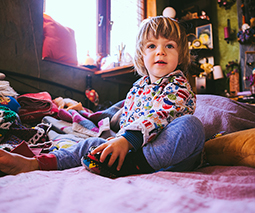Wait, what? Science says telling lies is actually good for kids

You might assume your chid is being a total rascal when they tell a porky pie, but researchers suggest that this early stretching of the truth has a silver lining.
Children who lie have higher IQs
Would it make you feel better to know that your child who tells lies is smarter than the child who always tells the truth? It’s OK if you had to think about that for a second, I did too. But as this recent New York Times (NYT) article argues, when it comes to our childrens’ development, there are actually some very solid positives when it comes to telling lies. True story.
It all starts with development psychologist Michael Lewis who conducted a series of experiments with toddlers back in the 1980’s. Professor Lewis found that the “young children who disobeyed an instruction and then denied having disobeyed were discovered to have higher IQs than those who admitted disobedience.”
Professor Lewis discovered most children learn how to lie around the age of two, and that given the chance, most of them will give it a shot. In fact, as the NYT reports: “a third of 2-year-olds, half of 3-year-olds and 80 percent or more of children 4 and older will deny their transgression, regardless of their gender, race or family’s religion.”
Lying is ‘good’ for the brain
High IQ is not the only ‘benefit’ of lying. As the NYT piece reports “several other” researchers have found children who tell lies have better “executive functioning skills” (the things that help us control impulses and focus on tasks), “theory of mind” (that ability to see the world through other people’s eyes) and are even more socially adjusted than their honest compatriots.
Confusing, right? As the NYT piece argues this information presents an alarming “paradox” for parents. Of course we want our children to be intelligent, but we also need to be able to tell when they’re telling the truth.
How do you discipline a child that tells lies?
Avoid harsh punishment like smacking and being sent to your room, advises psychologist Professor Kang Lee.
Her research, conducted in an West African pre-school found “non punitive appeals for truth” – for example, “ If you tell the truth I will be really pleased with you” promoted the most honest behaviour.
Exacting a verbal promise – that is, getting your child to swear they – “won’t lie to you anymore, mum and dad” also seems to work.
According to the NYT article, “multiple studies” found pledging to tell the truth has remedied the behaviour in children as early as the age of three, even when it’s inferred they don’t understand what a “promise” actually means.
Fascinating, isn’t it?
This post was originally published on Kinderling Kids Radio.









